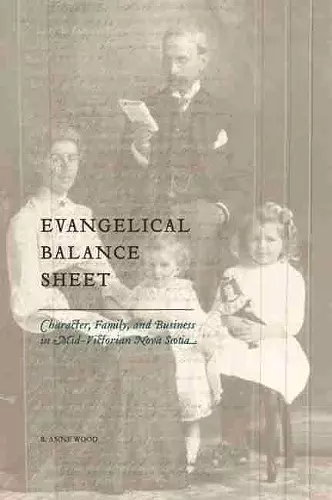Evangelical Balance Sheet
Character, Family, and Business in Mid-Victorian Nova Scotia
Format:Hardback
Publisher:Wilfrid Laurier University Press
Published:30th Aug '06
Currently unavailable, our supplier has not provided us a restock date

Using the journals of W. Norman Rudolf (1835-1886), a Victorian merchant, Evangelical Balance Sheet: Character, Family, and Business in Mid-Victorian Nova Scotia explores the important role of character ideals and evangelicalism in mid-Victorian culture. Rudolf's diary, with its daily weather observations, its account of family matters, of social and business happenings, and of his own experiences, as well as occasional literary or naturalistic forays, attempts to follow a disciplined regime of writing, but also has elements of a Bildungsroman. The diary reveals an obvious and significant tension between his inner, spiritual search for meaning in his life (evangelical inwardness) and his outward stewardship duties. Rudolf's concept of character, then, involved a type of balance sheet of his evangelical service record, to his God, his family, his business, and his community. Needing God's help to transform his will and to interpret the world in a constructive, rational manner, the underlying intent of his daily journal writing was to keep his commitment to an ethic of benevolence and of the affirmation of the goodness of human beings.
Wood elucidates the cultivation of civic-minded masculinity in the context of Victorian Maritime Canada, analyzing the multiple facets of the character ideal and emphasizing its important role in Victorians' understanding of their life experiences. In the process Wood reveals many underlying assumptions about social change and about civic discourse. The book also describes how the tremendous economic upheavals experienced by many entrepreneurs in the late 1860s to 1880s tempered their evangelical zeal and made it increasingly difficult for them to achieve a balanced and humane perspective on their own lives.
Evangelical Balance Sheet will appeal to a broad audience interested in social history, imperial studies, gender studies (especially changing ideas of masculinity and manhood), Atlantic Canada studies, and local history of the Pictou region.
``From 1862 until his death in 1886 at age 51, Norman Rudolf, a Pictou businessman, head of a growing family, active in the life of his local Anglican church, the Sons of Temperance and the YMCA, recorded his perceptions of daily life in five volumes of his journal.... [Since] the journal was the only document left by Rudolf [it] represented a formidable interpretive challenge. Building on her extensive publications on various aspects of nineteenth-century Pictou life, Anne Wood has succeeded admirably in placing it within a meaningful cultural context.'' -- Marguerite Van Die, Queen's University -- Social History, 2007, 200705
``In Evangelical Balance Sheet, Anne Wood explores that most elusive concept, character, and the way character, particularly its masculne iteration, was constructed in mid-Victorian Nova Scotia. Specifically, Wood examines the Victorian ideal of character through the private observations and analysis of a single man, Norman Rudolph, in journal entries written over a twenty-five-year period. Rudolph, a member of the evangelical wing of the Church of England, is an intriguing subject for such a study. Little has been written about the experience of Anglican evangelicals, and historians will welcome this addition to the growing body of historiography dealing with the relationship between evangelical sensibilities and social, economic, and political life.... As the acknowledged authority on the Scottish milieu of Pictou, Wood brings a unique insight to the topic, deftly situating Rudolph's experiences within the broader community context.... Wood has made the most of Rudolph's extraordinary diary.'' -- Gail Campbell -- University of Toronto Quarterly, Letters in Canada 2006, Volume 77, Number 1, Winter 2008, 200807
``Rudolph's life story...provides an effective medium through which to analyze the complex Victorian notion of ideal character.'' -- Queen's University -- Victorian Newsletter, Spring 2007, 200705
ISBN: 9780889205000
Dimensions: 236mm x 158mm x 19mm
Weight: 505g
228 pages